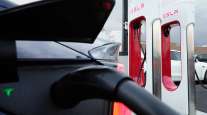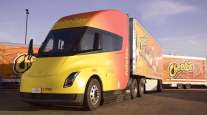Bloomberg News
Hertz to Sell 20,000 EVs in Shift Back to Gas-Powered Cars

[Stay on top of transportation news: Get TTNews in your inbox.]
Hertz Global Holdings Inc. plans to sell a third of its U.S. electric vehicle fleet and reinvest in gas-powered cars due to weak demand and high repair costs for its battery-powered options.
The sales of 20,000 EVs began last month and will continue over the course of 2024, the rental giant said Jan. 11 in a regulatory filing. Hertz will record a non-cash charge in its fourth-quarter results of about $245 million related to incremental net depreciation expense.
The dramatic reversal, after Hertz announced plans in 2021 to buy 100,000 Tesla Inc. vehicles, underscores the waning demand for all-electric cars in the U.S. EV sales slowed sharply over the course of 2023, rising just 1.3% in the final quarter.
“The company expects to reinvest a portion of the proceeds from the sale of EVs into the purchase of internal combustion engine vehicles to meet customer demand,” according to the filing. Hertz said it “expects this action to better balance supply against expected demand of EVs.”
Hertz shares fell 4.6% before regular trading in New York. The stock declined 32% last year.
The shift back to more conventional cars marks a reversal of Hertz CEO Stephen Scherr’s strategy centered on EVs, which the company hoped would fetch higher prices at the counter and hold their value. Tesla’s price cuts over the past year lowered the value of the cars in Hertz’s fleet and with EV sales growth slowing, it’s not clear if consumers will have an appetite for them in the used car market.
Want more news? Listen to today's daily briefing above or go here for more info
Hertz said in its filing that selling some EVs should improve cash flow and earnings this year and next. By year-end 2025, the company expects improved financial results driven by higher revenue per day and lower depreciation and operating expenses. The company sees incremental free cash flow of as much as $300 million in the aggregate over 2024 and 2025.
Scherr signaled this shift would come, saying in October that the company would scale back on EVs, which had made up 11% of its total fleet. Teslas represented 80% of that.
Tesla’s price cuts raised his company’s depreciation costs, Scherr said. EVs also come with higher repair costs compared to the rest of its cars, which has hurt its bottom line and played a big role in missing third-quarter earnings estimates.
“EVs will be slower than our prior expectations,” he said during the company’s third-quarter earnings call.




